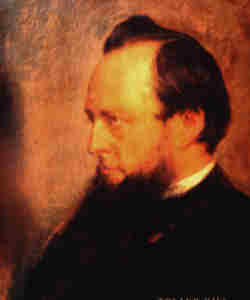
AnthonyFlood.com
Philosophy against Misosophy

From Whose Togas I Dangle
A Gallery of Heroes
John Emerich Edward Dalberg Acton
1834-1902
A subjective sampling culled from Roland Hill, Lord Acton, Yale University Press, 2000.
The Quotable Acton
On Liberty
By liberty I mean the assurance that every man shall be protected in doing what he be-lieves his duty against the influence of authority and majorities. The State is competent to as-sign duties and draw the line between good and evil only in its immediate sphere. . . . In ancient times the State absorbed authorities not it own, and intruded on the domain of personal free-dom. In the Middle Ages it possessed too little authority, and suffered others to intrude. Modern States fall habitually into both exces-ses. The most certain test by which we judge whether a country is really free is the amount of security enjoyed by minorities. Liberty, by this definition, is the essential condition and guar-dian of religion; and it is in the history of the Chosen People, accordingly, that the first illus-trations of my subject are obtained. The go-vernment of the Israelites was a Federation, held together by no political authority, but by the unity of race and faith, and founded, not on physical force, but on a voluntary covenant. (278)
On Power
Suspect power more than vice. (414)
Power tends to corrupt, and absolute power corrupts absolutely. Great men are almost al-ways bad men, even when they exercise influ-ence and not authority: still more when you su-peradd the tendency or the certainty of corrup-tion by authority. There is no worse heresy than that the office sanctifies the holder of it. (300)
You would hang a man of no position, like Ravaillac; but if what one hears is true, then Eli-zabeth asked the gaoler to murder Mary, and William III ordered his Scots minister to extir-pate a clan. Here are the greatest names coup-led with the greatest crimes. You would spare these criminals, for some mysterious reason. I would hang them higher than Haman, for rea-sons of quite obvious justice; still more, still higher, for the sake of historical science. (300)
And my dogma is not the special wickedness of my own spiritual Superiors, but the general wickedness of men in authority, of Luther and Zwingli and Calvin and Cranmer and Knox, of Mary Stuart and Henry VIII, of Philip II and Eli-zabeth, or Cromwell and Louis XIV, James and Clarles and Willam, Bossuet . . . (301)
On History
History is an iconoclast, not a school of re-verence. (400)
History has done much to encourage the de-light in war. The motive has been to make men willing to fight, and to dissimulate the dis-courage facts: the night after the battle, the scenes in the hospital, the horrible wounds, the ruined homes, the devastation, the suffering and misery, the terrors of sudden death, all kept out of sight, the horrors of captured towns. (399)
History had depended on theology, juris-prudence, philology. [It] has outgrown them. No further troubles of that kind [but it is] still in-terfered with by politics. . . . The history of ideas undermines national treatment—ideas are not national, like laws and customs. (400)
All understanding of history depends on one's understanding of the forces that make it, of which religious forces are most active, and the most definite. We can't follow all the varia-tions of a human mind, but when we know the religious motive . . . we have the master key." (285)
On Historians
By an honest historian we mean one who pleads no cause, who keeps no shelter for a friend, no pillory for a foe—who does the same justice to that which he loathes as to that which he loves. (400)
No priest, accustomed to the Confessional, and a fortiori no historian, thinks well of human nature." (416)
On the Retroactive Application of Infallibility
The Bulls which imposed a belief in the de-posing power [of Popes], the Bulls which pre-scribed the tortures and kindled the flames of the Inquisition, the Bulls which erected witch-craft into a system and made the extermination of witches a frightful reality, would become as venerable as the decrees of Nicaea, as incontro-vertible as the writings of S. Luke. . . . And the sentences of every Protestant judge (by the Bull Cum ex Apostolatus Officio) would be in-valid. (197)
To me they [Ultramontanists] are in religion what Jacobins and Communards are in politics. (323)
On the Purpose of the Best Books
[T]o open windows in every direction, to raise him to the level of his age, so that he may know the (twenty or thirty) forces that have made our world what it is, and still reign over it; to guard him against surprises, and against the constant sources of error within; to supply him both with the strongest stimulants and the surest guides; to give force and fulness and clearness and sincerity to his mind, that he may know the method and law of the process by which error is conquered and truth is won: dis-cerning knowledge from probability and pre-judice from belief; that he may learn to master what he rejects as fully as what he adopts; that he may understand the origin as well as the strength and vitality of systems and the better motives of men who are wrong; to steel him against the charm of literary beauty and talent, so that each book, thoroughly taken in, shall be the beginning of a new life and shall make a new man of him. (286)